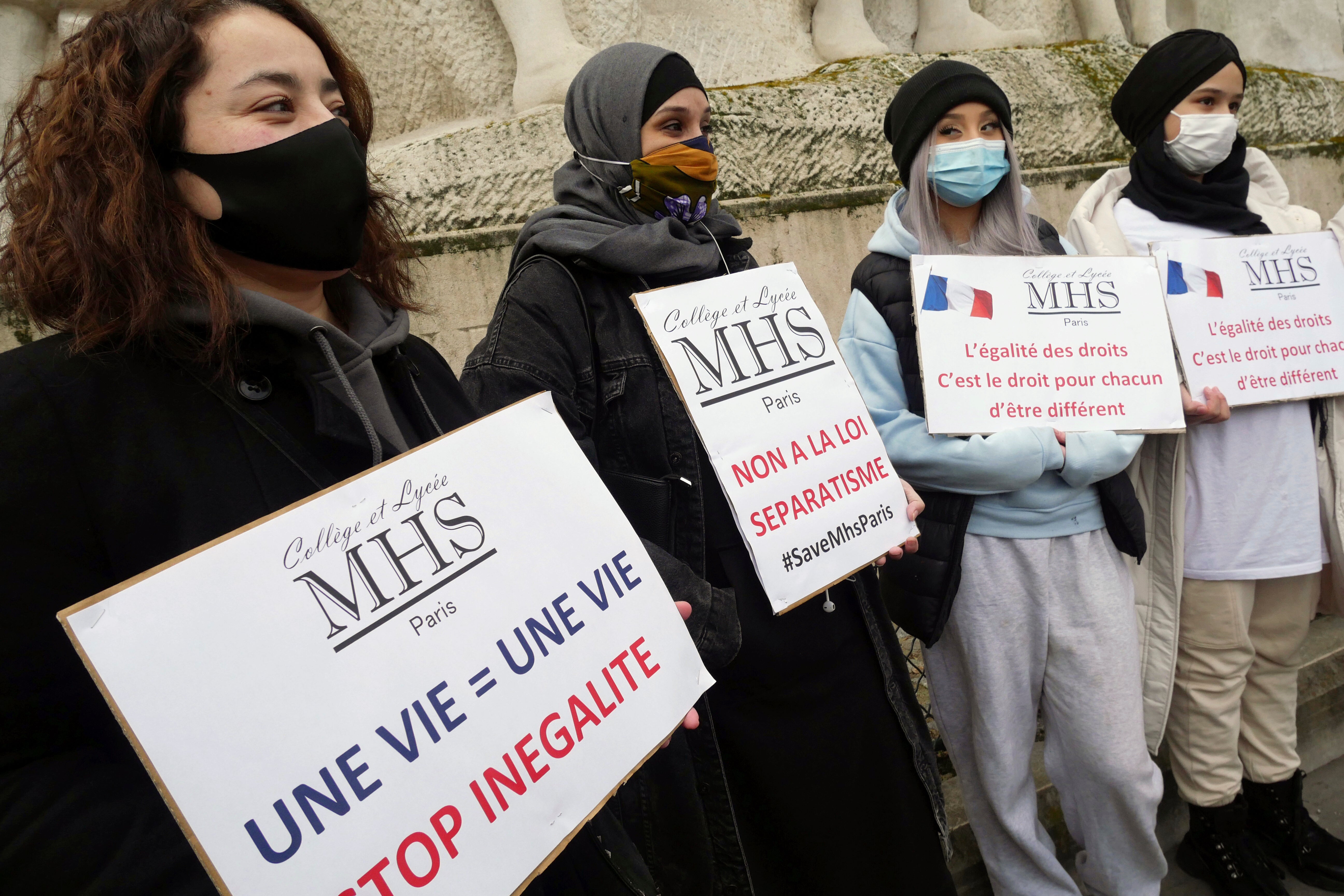Controversial bill to fight ‘Islamist separatism’ passes first stage of French parliament
Interior minister says ‘sole aim’ is to ‘defend the values of the Republic’

Your support helps us to tell the story
From reproductive rights to climate change to Big Tech, The Independent is on the ground when the story is developing. Whether it's investigating the financials of Elon Musk's pro-Trump PAC or producing our latest documentary, 'The A Word', which shines a light on the American women fighting for reproductive rights, we know how important it is to parse out the facts from the messaging.
At such a critical moment in US history, we need reporters on the ground. Your donation allows us to keep sending journalists to speak to both sides of the story.
The Independent is trusted by Americans across the entire political spectrum. And unlike many other quality news outlets, we choose not to lock Americans out of our reporting and analysis with paywalls. We believe quality journalism should be available to everyone, paid for by those who can afford it.
Your support makes all the difference.A controversial bill introducing new measures to tackle Islamist “separatism” has passed the first stage of the French parliament, in the wake of several terror attacks last year.
The legislation - which does not mention Islam and Muslims by name - contains a host of measures tackling radicalism and promoting respect for French values.
It has been hotly contested by some Muslims, politicians and others who fear the state is intruding on essential freedoms and pointing a finger at Islam, the nation’s second religion.
Protesters gathered outside parliament over the weekend to denounce the bill, holding signs saying “Equality of rights is the right of everyone to be different” and “No to the marginalisation of Muslims”.
The bill increases oversight of mosques, schools and associations and would ensure children attend regular schools from three years old, among other provisions.
A section that makes it a crime to knowingly endanger the life of a person by providing details of their private life and location is known as the ‘’Paty law” after Samuel Paty, a teacher beheaded outside his school last year after information about where he taught was posted online in a video.
The bill was overwhelmingly approved in France’s lower house of parliament on Tuesday, following two weeks of intense debate.
It is due to reach the conservative-controlled upper house at the end of March, where it is expected to be passed.
The bill gained added urgency following the beheading of Paty, who had showed pupils caricatures of the Prophet Muhammad, last October and a fatal knife attack inside a church in Nice, where three people were killed, later that month.
In September, two people were injured in a stabbing outside the old Charlie Hebdo offices last year, which the French interior minister told media was “clearly an act of Islamist terrorism”.
The bill passed by the National Assembly on Tuesday has been dubbed the "separatism" bill, a term used by Emmanuel Macron, the French president, to refer to radicals who would create a "counter society" in France.
The legislation has gone through various name changes and is now known by the title “Supporting respect for the principles of the Republic”.
Asked by French newspaper Le Monde last year why a focus seems to be on radical Islamism, but this is not touched upon in the law’s name, Jean Castex said: “It isn’t just that in the text.”
“But the enemy of the Republic is a political ideology called radical Islamism, which aims to cause divisions among the French population.”
Gerald Darmanin, the interior minister, said the bill had the “sole aim” to “defend the values of the Republic” after it was approved on Tuesday.
Ministers have said the aim is to reduce the space where radicals can operate and ensure that French values, including secularism, are guaranteed.
But critics say the proposed law as a political ploy to lure the right wing to Macron’s centrist party ahead of next year’s presidential election.
Days before Tuesday’s vote, Mr Darmanin, the bill’s main sponsor, accused far-right leader Marine Le Pen during a nationally televised debate of being "soft" on radical Islam, saying she needs to take vitamins.
The remark was intended to portray the government as tougher than the far-right in tackling Islamic extremists. But Ms Le Pen criticized the bill as too weak and offered what she called her own, tougher counter-proposal.
Ghaleb Bencheikh, head of the Foundation for Islam of France, a secular body seeking a progressive Islam, said in a recent interview that the planned law was "unjust but necessary" to fight radicalisation.
Among other provisions, the bill would ban virginity certificates and crack down on polygamy and forced marriage, practices not formally attached to a religion. Critics say those and other provisions are already covered in existing laws.
It would also ensure that children attend regular school from the age of three, a way to target home schools where ideology is taught, and provide for training all public employees in secularism.
Anyone who threatens a public employee also risks a prison sentence under the legislation.
The bill introduces mechanisms to guarantee that mosques and associations that run them are not under the sway of foreign interests or homegrown Salafists with a rigorous interpretation of Islam.
Associations must sign a contract of respect for French values and pay back state funds, if they cross a line.
Another measure would require police officers and prison employees to take an oath swearing to respect the nation’s values and the constitution.
Additional reporting by Associated Press






Join our commenting forum
Join thought-provoking conversations, follow other Independent readers and see their replies
Comments